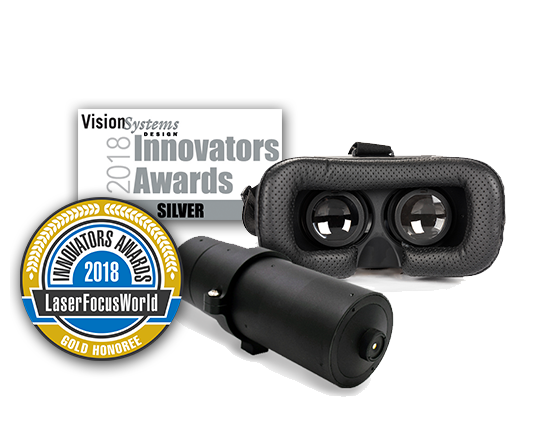Radiant to Demonstrate New Optical Solutions for VR/AR Headsets
Radiant announces that it will demonstrate new optical solutions for AR/VR display test and near-infrared light measurement from booth #3113 at the Photonics West Exhibition, taking place in San Francisco, CA, February 5-7, 2019.
Radiant Vision Systems, a leading provider of test and measurement solutions for lighting and displays, announces that it will demonstrate two new optical solutions for light and display measurement from booth #3113 at the Photonics West Exhibition. The company’s newly released NIR Intensity Lens and AR/VR Lens will be showcased in demonstrations of automated visual inspection for near-infrared light source measurement and virtual reality display testing at the exhibition, which takes place February 5-7, 2019, at The Moscone Center in San Francisco, California, U.S.A.
Emerging light and display technologies for AR/VR and 3D sensing like facial recognition require precise characterization to achieve design goals and meet the high standards of quality expected by today’s customers. Accuracy of data (luminance, color, image quality, etc., according to human visual perception) and measurement efficiency can determine a manufacturer’s competitive success. Radiant Vision Systems has worked with leading manufacturers of today’s emerging technologies to develop photometric and radiometric imaging solutions around specific measurement challenges that enable quick and complete characterization of light-source and display performance for design and quality control. The latest additions to the Radiant product portfolio—the new AR/VR Lens and NIR Intensity Lens—combine optics, high-resolution imaging systems, and pre-defined software test suites in compact scientific solutions to help manufacturers simplify the process of light and display measurement for unique applications. Applications of these solutions include virtual reality (VR) and augmented reality (AR) display testing, and near-infrared (near-IR or NIR) light source characterization for LEDs and lasers used in 3D sensing devices.
The use of near-IR emissions for 3D sensing is growing rapidly in facial recognition for device security, eye tracking in augmented and virtual reality devices, gesture control for multi-modal human-machine interfaces, and even automotive LiDAR. Because of the demand for more near-IR interfaces in high-end consumer technology, the need for effective, production-ready measurement systems is critical for mass manufacturing of safe and quality NIR-sensing devices. Demonstrated at Photonics West, Radiant’s NIR Intensity Lens solution is the first commercially available Fourier optic component applied for measuring near-IR light sources and structured light patterns to evaluate intensity and accuracy. The lens system captures precise radiometric values of near-IR light across angular distributions to +/-70 degrees in a single image with approximately 0.05-degree pixel resolution at every point measured. Patterns produced for 3D sensing by diffractive optical elements (DOE), which may contain tens of thousands of tiny emission points, can be analyzed by the system in a single image. These analyses provide extensive data output for each pattern as well as each individual dot in the array. The NIR Intensity Lens system is designed for precise measurement of wavelengths from 930-950 nanometers—the range used by many devices for 3D sensing applications such as facial and gesture recognition.
New measurement applications in virtual and augmented reality require proximity testing of small, high-resolution displays, many offering wide fields of view (FOV) for immersive viewing experiences. These displays are integrated into headsets or goggles, which can impact the viewing experience due to their nearness to the human eye. Beyond testing the display alone, AR/VR visualization testing requires replicating the visual experience of the user who is wearing the head-mounted device. Traditional optics are unable to capture a full image of these immersive displays as viewed through headsets due to their physical size and optical geometry limitations. Demonstrated at Photonics West, Radiant’s AR/VR Lensaddresses this issue by utilizing wide-FOV optics and a lens design that features an aperture at the front to enable positioning the photometric imaging system’s entrance pupil at the human eye position in headsets. The lens captures a display FOV to 120 degrees horizontal in a single image, evaluating display characteristics from luminance and uniformity to distortion and modulation transfer function (MTF) at extreme proximity as viewed through the headset viewing aperture.
In addition to demonstrating light and display testing for AR/VR and near-IR applications, Radiant’s team of test and measurement experts will be on staff at the Photonics West exhibition to meet with attendees to discuss unique measurement challenges for any illuminated component, from flat panel displays (FPD) to curved OLED, and from bare LEDs to large light sources.
For more information about light and display test systems, visit the Radiant Vision Systems booth #3113 at Photonics West, or find solutions online at http://www.RadiantVisionSystems.com.
About Radiant Vision Systems
Radiant Vision Systems works with world-class brands and manufacturers to deliver creative visual inspection solutions that improve quality, reduce costs, and increase customer satisfaction. Radiant’s legacy of technology innovation in photometric imaging and worldwide install base date back more than 25 years and address applications from consumer electronics to automotive manufacturing. Radiant Vision Systems product lines include TrueTest™ automated visual inspection software for quality control, and ProMetric® imaging colorimeters, photometers, and light source measurement systems. Radiant is headquartered in Redmond, Washington, USA, with strategic offices in California, China, and South Korea. Radiant has been a part of Konica Minolta’s Sensing Business Unit since August 2015. For more information, visit http://www.RadiantVisionSystems.com.


